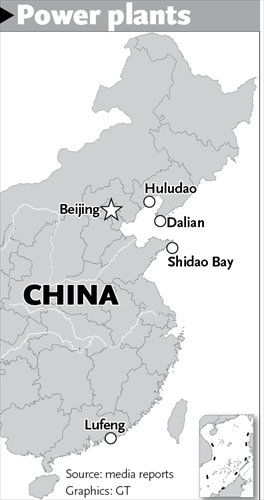HOME >> SCI-TECH
NDRC approves restart of nuclear power plants
By Yang Jing Source:Global Times Published: 2014-9-26 0:13:01
Nation seeks to boost clean energy capacity as it battles pollution

Nuclear power plants
China's top economic planner has given green light for the restart of four nuclear power projects after a suspension over safety concerns amid the 2011 Fukushima nuclear crisis, media reported Thursday.
The four nuclear power projects approved by the National Development and Reform Commission (NDRC) are all located in coastal areas and have combined capacity of more than 10 million kilowatts, the Beijing-based China Securities Journal reported on Thursday, citing sources.
The plants are expected to go into production in 2017. The nuclear project based in Shidao Bay, East China's Shandong Province may be the first among the four projects to get restarted, the report said.
China Huaneng Group, China Nuclear Engineering Group and Tsinghua University hold 47.5 percent, 32.5 percent and 20 percent stake in Shidao Bay Nuclear Power Co respectively.
The NDRC did not reply to a faxed inquiry from the Global Times by press time and China Huaneng Group could not be reached for comment,
The other three nuclear power projects are located in Huludao and Dalian of Northeast China's Liaoning Province, and Lufeng of South China's Guangdong Province, according to the report.
Experts said the restart of the four projects came as no surprise.
Compared with other sources of clean energy such as wind and solar, nuclear energy is much more stable and cost-effective, Lin Boqiang, director of the China Center for Energy Economics Research at Xiamen University, told the Global Times Thursday.
Han Xiaoping, chief information officer at energy portal china5e.com, agreed with Lin, saying nuclear energy should take a bigger share in China's power mix.
Now nuclear energy accounts for 2 percent in China's power generation, media reports said.
Premier Li Keqiang said at an energy conference that China will start new nuclear power projects in eastern coastal areas, the Xinhua News Agency reported on April 20.
Lin believed that the country may approve new projects in the next 12 months.
China conducted a complete safety check on all of its nuclear facilities after the explosion at Japan's Fukushima nuclear plant in 2011, and halted approval of new nuclear power projects.
Han said that after the tragic accident in Japan, China further improved its nuclear energy facilities, especially in terms of safety standards, which ensured a high-level safety for its nuclear power plants.
In addition to candidly communicating safety risks with local residents, nuclear power plant operators should also highlight the benefits of the plants to local communities, including job creation and economic development, Lin noted.
China is heavily relying on coal for power generation, leading to serious air pollution, which is prompting the country to explore clean power sources including nuclear energy.
China's National Energy Administration launched an air pollution control program in May and planned to have 40 million kilowatts of nuclear power capacity by 2015, from the current 18 million kilowatts, the report said.
Posted in: Energy